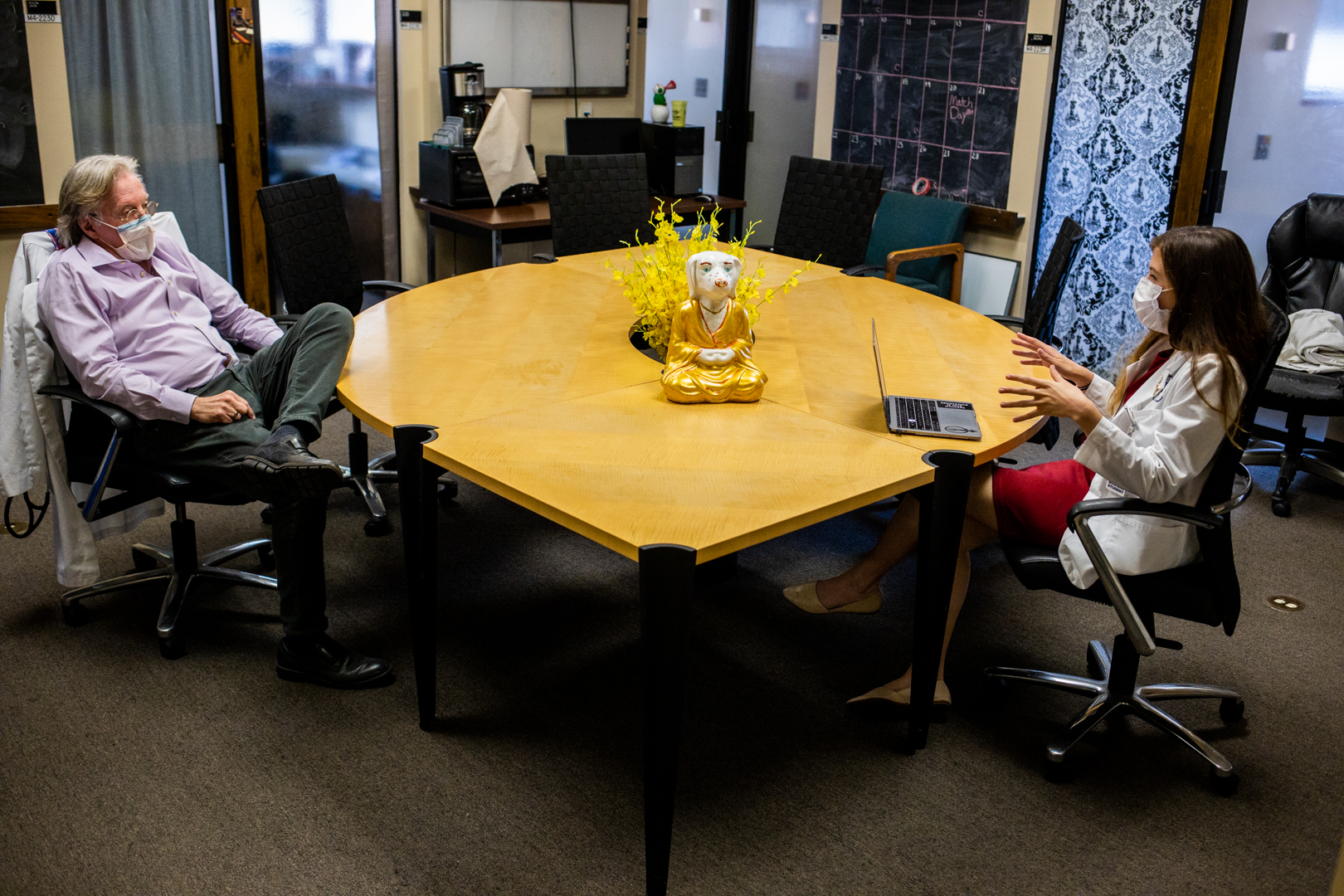Faith And Medicine In Global Health
In the realm of global health, the dynamic interplay between faith and medicine has been a defining factor in shaping healthcare practices and outcomes. Across diverse cultures and societies, religious beliefs often play a pivotal role in influencing health-seeking behaviors, treatment choices, and the overall approach to well-being. This article delves into the multifaceted relationship between faith and medicine on a global scale, exploring the ways in which these two spheres intersect and collaborate for the betterment of public health.
Author:Suleman ShahReviewer:Han JuFeb 06, 202411.5K Shares350.7K Views

In the realm of global health, the dynamic interplay between faith and medicinehas been a defining factor in shaping healthcare practices and outcomes. Across diverse cultures and societies, religious beliefs often play a pivotal role in influencing health-seeking behaviors, treatment choices, and the overall approach to well-being.
This article delves into the multifaceted relationship between faith and medicine on a global scale, exploring the ways in which these two spheres intersect and collaborate for the betterment of public health and how we can heal our souland our corporal body.
Religious Influences On Health Practices - Embracing Diversity For Holistic Well-being
Diverse Perspectives, Common Ground
Religious diversityworldwide weaves a rich tapestry of health practices, each thread reflecting the unique beliefs and traditions of different communities. From the ancient Ayurvedic traditions embedded in Hinduism to the healing rituals deeply ingrained in indigenous belief systems, faith consistently serves as the bedrock of various health-related customs. This diversity underscores the importance of recognizing and respecting the unique perspectives that faith brings to health, as it is fundamental to creating inclusive healthcare strategies that resonate with the cultural and spiritual nuances of local communities.
Faith-Based Healthcare Initiatives - Nurturing Compassion Through Action
Charitable Work And Healing Missions
Driven by a profound sense of compassion and duty, religious organizations play a vital role in shaping global health through their engagement in healthcare initiatives. Missionary hospitals, clinics, and charitable organizations rooted in diverse faith traditions contribute significantly to the well-being of communities worldwide. These initiatives often serve as a beacon of hope for underserved populations, providing essential medical services to those who lack access to adequate healthcare resources.
In regions with limited healthcare infrastructure, faith-based healthcare initiatives become crucial lifelines, offering not only medical assistance but also addressing the broader socio-economic determinants of health. By focusing on the most vulnerable populations, these organizations embody the principle of healthcare as a universal right, irrespective of religious or cultural background.
Challenges And Triumphs In Faith-Driven Healthcare
While the impact of faith-based healthcare initiatives is substantial, they also encounter challenges, particularly in the realms of cultural competence and ethical considerations. Navigating through diverse belief systems and cultural contexts requires a nuanced approach to ensure that medical care aligns with local values.
Additionally, maintaining a delicate balance between providing essential services and respecting individual autonomy can pose ethical dilemmas. Addressing these challenges ensures that faith-based healthcare remains a force for good while upholding the principles of cultural sensitivity and ethical medical practice.
The Significance Of An Interdisciplinary Approach To Global Health
Expanding Beyond Cellular And Clinical Boundaries
Health, in its true essence, extends beyond the confines of cellular and clinical medicine. A holistic understanding of well-being encompasses social, economic, cultural, and environmental factors that influence populations worldwide. Embracing this comprehensive perspective is imperative for effective global health interventions that resonate with the diverse needs and challenges faced by communities across the globe.
Global Health
Global healthis not confined to specific regions; it is a universal imperative that demands attention to the health of everyone, irrespective of geographical borders. Health risks, whether infectious diseases, environmental threats, or socio-economic disparities, transcend boundaries, necessitating a collective and interdisciplinary approach to address these challenges.
Creativity In Addressing Cross-Border Risks
The interconnected nature of global health challenges requires creativity and innovation at all levels. An interdisciplinary approach brings together diverse fields such as medicine, public health, sociology, economics, and environmental science. This collaborative synergy fosters creative problem-solving, allowing for a more nuanced understanding of the multifaceted issues affecting global health.
Beyond Clinical Interventions
Understanding and addressing social determinants of health is central to an interdisciplinary approach. Factors such as education, income inequality, cultural practices, and access to clean water contribute significantly to health outcomes. An interdisciplinary lens allows for a more comprehensive analysis of these determinants, paving the way for interventions that extend beyond clinical settings to create lasting improvements in population health.
The Role Of Global Governance
In the context of global health, effective governance is paramount. Addressing health challenges on a global scale requires coordination and collaboration among nations, organizations, and diverse stakeholders. An interdisciplinary approach is vital in shaping global governance frameworks that are adaptive, inclusive, and responsive to the evolving landscape of health risks and emergencies.
Bridging Disciplines For Holistic Solutions
An interdisciplinary approach fosters collaboration among experts from various fields, ensuring that interventions are well-rounded and culturally sensitive. By bringing together professionals with diverse expertise, the global health community can develop and implement strategies that consider the unique contexts of different populations.
The Power Of Faith In Healing Narratives
Stories Of Miracles And Resilience
Religious texts abound with narratives of healing, resilience, and miracles. These stories shape individuals' attitudes towards health and recovery, offering insights into the intersection of faith with the human experience of illness and healing. Examining these narratives deepens our understanding of the profound impact that faith can have on the healing journey, inspiring hope and fostering resilience.
In navigating the intricate relationship between faith and medicine in global health, embracing diversity, respecting local beliefs, and fostering cultural competence are essential.
Recognizing The Imperative Of Collaboration
In the ever-evolving landscape of global health, the imperative of collaboration has emerged as a cornerstone for fostering holistic well-being. The acknowledgment of the interconnectedness of religious, healthcare, and policy domains has prompted a paradigm shift towards inclusive and collaborative approaches. This section explores the pivotal role that global collaboration plays in shaping comprehensive health programs that respect diverse beliefs and promote holistic well-being.
Building Bridges Across Sectors
Fostering Dialogue And Understanding
Global health efforts are at their most potent when different sectors collaborate synergistically. Religious leaders, healthcare professionals, and policymakers bring unique perspectives to the table. Facilitating open and respectful dialogue among these stakeholders is paramount. Such dialogue fosters a deep understanding of each other's priorities, challenges, and aspirations, laying the foundation for collaborative endeavors that transcend individual perspectives.
Bridging Cultural Divides
Cultural competence is essential in the development of global health programs. Collaboration allows for the integration of cultural nuances into healthcare strategies. Religious leaders, intimately connected with cultural practices, can provide invaluable insights that ensure healthcare interventions are culturally sensitive and tailored to the needs of diverse communities.
Creating Comprehensive Health Programs
Respecting Diverse Beliefs
One of the key benefits of collaboration is the ability to design health programs that respect diverse religious beliefs. By involving religious leaders, programs can be crafted to align with cultural norms and spiritual values. This inclusivity not only enhances the acceptability of health interventions but also ensures they are more effective in engaging communities.
Holistic Approaches To Well-being
Holistic well-being encompasses physical, mental, and spiritual dimensions. Through collaboration, health programs can adopt a more comprehensive approach that goes beyond the conventional medical model. Integrating spiritual practicesand cultural rituals into health interventions acknowledges the interconnected nature of well-being, promoting a more holistic understanding of health.
Challenges And Triumphs Of Collaboration
Navigating Challenges
While collaboration holds immense promise, it is not without challenges. Differing priorities, communication barriers, and cultural misunderstandings may arise. Navigating these challenges requires commitment, active listening, and a genuine willingness to understand and incorporate diverse perspectives. Overcoming these hurdles strengthens collaboration and enhances the impact of global health initiatives.
Celebrating Successes
Successful collaboration is marked by transformative outcomes. Shared goals, innovative approaches, and improved health outcomes are the fruits of effective collaboration. Celebrating these successes not only motivates stakeholders but also serves as a testament to the power of collective action in the pursuit of global well-being.
Faith And Medicine - FAQs
How Are Medicine And Faith Linked?
The link between medicine and faith is intricate and multifaceted. Faith can influence health outcomes by shaping individuals' beliefs, behaviors, and attitudes towards medical care. It plays a role in health-seeking behaviors, treatment adherence, and coping mechanisms. Many individuals draw upon their faith for emotional support and resilience during illness. Moreover, the placebo effect demonstrates how belief and expectation, often rooted in faith, can have tangible physiological effects, showcasing a direct link between mental and physical well-being.
How Is Faith Related To Health?
Faith is related to health in various ways, encompassing physical, mental, and social dimensions. Religiously affiliated individuals often exhibit better mental health, coping mechanisms, and overall well-being. Engaging in religious practices, such as prayer or meditation, may reduce stress and contribute to a positive mental state. Faith communities can provide social support, fostering a sense of belonging that positively impacts mental and emotional health. Additionally, studies suggest that individuals with strong religious beliefs may experience lower rates of certain health conditions, highlighting the potential impact of faith on physical health.
What Is The Role Of Faith In Healing Faith And Medicine?
Faith plays a significant role in healing and medicine, both in the psychological and physiological realms.
- Psychological Support:Faithprovides individuals with a source of comfort, hope, and meaning during times of illness. The emotional support derived from religious beliefs can contribute to reduced anxiety, stress, and improved mental well-being, all of which are conducive to the healing process.
- Placebo Effect:The placebo effect, where individuals experience real improvements in their condition due to belief in the efficacy of a treatment, underscores the psychological impact of faith on healing. This phenomenon highlights the mind-body connection and the role of belief systems in influencing health outcomes.
- Coping Mechanisms:Faith often serves as a coping mechanism for individuals facing health challenges. Spiritual practices, rituals, and communal support within religious communities can provide a framework for navigating illness and finding resilience in the face of adversity.
- Integrated Approaches:In some cases, faith is integrated into medical practices. Faith-based healthcare initiatives, such as hospitals or clinics run by religious organizations, may incorporate spiritual components into patient care. This holistic approach recognizes the interconnectedness of physical, mental, and spiritual dimensions in the healing process.
Conclusion
In the intricate dance between faith and medicine in global health, acknowledging the diverse ways in which these realms intersect is crucial for fostering effective and inclusive healthcare. By embracing the strengths of both faith-based initiatives and evidence-based medical practices, we can move towards a future where holistic well-being is at the forefront of global health endeavors. Through dialogue, cultural competence, and collaborative efforts, faith and medicine can synergize to create a world where health is a shared journey, guided by compassion, understanding, and respect for diverse beliefs.
Jump to
Religious Influences On Health Practices - Embracing Diversity For Holistic Well-being
The Significance Of An Interdisciplinary Approach To Global Health
The Power Of Faith In Healing Narratives
Recognizing The Imperative Of Collaboration
Building Bridges Across Sectors
Creating Comprehensive Health Programs
Challenges And Triumphs Of Collaboration
Faith And Medicine - FAQs
Conclusion

Suleman Shah
Author
Suleman Shah is a researcher and freelance writer. As a researcher, he has worked with MNS University of Agriculture, Multan (Pakistan) and Texas A & M University (USA). He regularly writes science articles and blogs for science news website immersse.com and open access publishers OA Publishing London and Scientific Times. He loves to keep himself updated on scientific developments and convert these developments into everyday language to update the readers about the developments in the scientific era. His primary research focus is Plant sciences, and he contributed to this field by publishing his research in scientific journals and presenting his work at many Conferences.
Shah graduated from the University of Agriculture Faisalabad (Pakistan) and started his professional carrier with Jaffer Agro Services and later with the Agriculture Department of the Government of Pakistan. His research interest compelled and attracted him to proceed with his carrier in Plant sciences research. So, he started his Ph.D. in Soil Science at MNS University of Agriculture Multan (Pakistan). Later, he started working as a visiting scholar with Texas A&M University (USA).
Shah’s experience with big Open Excess publishers like Springers, Frontiers, MDPI, etc., testified to his belief in Open Access as a barrier-removing mechanism between researchers and the readers of their research. Shah believes that Open Access is revolutionizing the publication process and benefitting research in all fields.

Han Ju
Reviewer
Hello! I'm Han Ju, the heart behind World Wide Journals. My life is a unique tapestry woven from the threads of news, spirituality, and science, enriched by melodies from my guitar. Raised amidst tales of the ancient and the arcane, I developed a keen eye for the stories that truly matter. Through my work, I seek to bridge the seen with the unseen, marrying the rigor of science with the depth of spirituality.
Each article at World Wide Journals is a piece of this ongoing quest, blending analysis with personal reflection. Whether exploring quantum frontiers or strumming chords under the stars, my aim is to inspire and provoke thought, inviting you into a world where every discovery is a note in the grand symphony of existence.
Welcome aboard this journey of insight and exploration, where curiosity leads and music guides.
Latest Articles
Popular Articles



